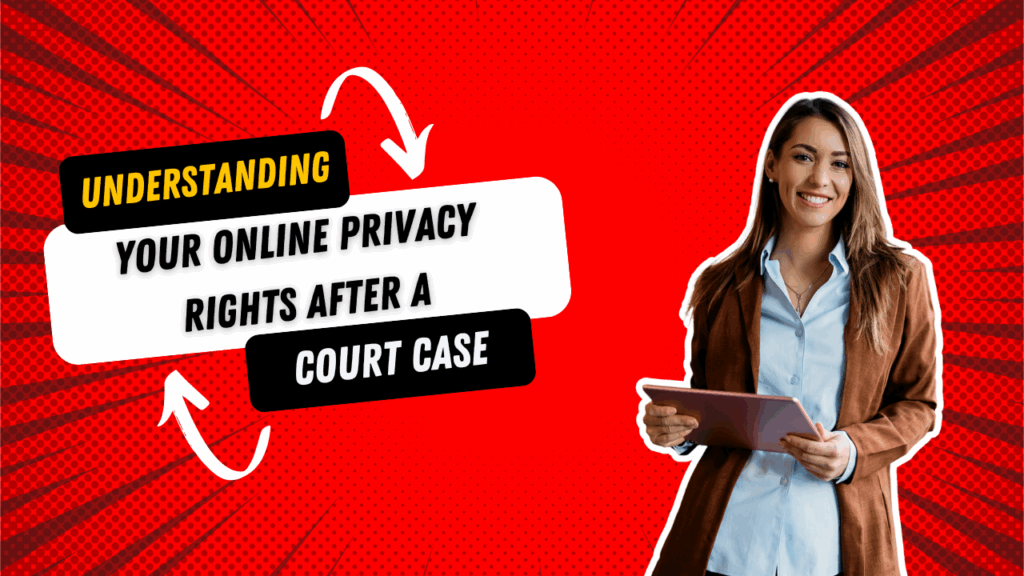If you’ve been through a court case, you might be surprised to find your name still floating around online. Court records, mugshots, and news stories can stay online for years. Even if your case was dismissed or sealed, that information can still be out there. So what can you do about it?
Dig Deeper: How to Remove Court Records from Google Search
Why Your Case Is Still Online
Court Records Are Public by Default
Most court records in the U.S. are public. That means anyone can access them. Court websites, third-party aggregators, and background check companies pull this data and post it online.
Your name, charges, case details, and outcomes are all fair game unless the record is sealed or expunged.
Search Engines Index Everything
Google and other search engines scan and list public data. If a court record is on a site, Google likely picked it up. Once indexed, it can appear in search results even if the case was resolved or outdated.
Third-Party Sites Don’t Always Update
Even if your court record is sealed, many background check sites don’t refresh their data automatically. This leads to old or incorrect records showing up long after they should have been taken down.
Your Legal Privacy Rights
Sealing vs. Expungement
Sealing a record hides it from public view but keeps it on file. Expungement erases it completely. Laws vary by state, but both options can help protect your online privacy.
If your record is expunged, you have the right to request removal from background check sites. However, they won’t always comply automatically.
Fair Credit Reporting Act (FCRA)
The FCRA protects you from outdated or incorrect background checks. Background check companies must keep their data accurate. If your record was cleared but still appears, you can file a dispute.
Right to Be Forgotten
This applies mainly in Europe under GDPR. But in the U.S., some states like California offer limited versions of this. It gives you the right to request removal of certain personal data.
What You Can Do to Protect Your Privacy
1. Request Removal From Background Check Sites
Find where your record appears. Sites like MyLife, BeenVerified, and Whitepages have opt-out forms. Fill them out with your case update (sealed, dismissed, etc.).
Some may ask for documents. Keep proof ready. Be patient, it can take a few weeks.
2. Use Google Removal Tools
Google allows you to request removal of certain results. You can use their form if the link includes outdated or private information.
This includes:
- Your home address
- Government ID numbers
- Confidential case outcomes
But keep in mind, Google won’t remove public legal records just because you ask. There has to be a valid privacy concern.
3. Build a Positive Online Presence
One of the best long-term strategies is to push negative results down. This is known as suppression. It works by publishing content that ranks higher than the court record.
Here are a few things you can do:
- Create a personal website using your name
- Post regular updates on LinkedIn, Twitter, or Medium
- Get featured in local news, blogs, or interviews
The goal is to own the first page of Google when someone searches your name.
4. Dispute Inaccurate Listings
If a background check site lists outdated or false data, you have the right to dispute it under the FCRA. They must investigate within 30 days.
Use this approach:
- Find the company’s dispute form
- Include proof of correction (expungement papers, court order)
- Keep copies of everything
This process can be frustrating but is often effective.
5. Work With a Reputation Management Service
If you’re overwhelmed, it might be time to call in the pros. A reputation management service like Top Shelf Reputation can:
- Identify where your case shows up
- Handle takedown requests
- Publish new content to bury old records
They know what works and who to contact. If your privacy matters, it’s worth the investment.
Why It Matters
Employers and Landlords Are Watching
According to a 2021 CareerBuilder survey, 66% of employers research candidates online. A court case, even if cleared, could cost you a job or apartment if it’s still online.
Identity Theft Is Real
Public records sometimes include personal data. If your name, birthday, or address is exposed, it puts you at risk. Online privacy is also about safety.
Peace of Mind
You deserve to move on from your past. Knowing your case is no longer public helps you rebuild. It gives you confidence in personal and professional situations.
Final Thoughts
Online privacy after a court case isn’t automatic. It takes effort, paperwork, and follow-through. But you do have rights.
Start by figuring out where your record shows up. Then use opt-out tools, push down old links, and get help if you need it.
If you’re serious about taking back control, Top Shelf Reputation has the tools to help. A clean search result can open doors, and close old chapters.

